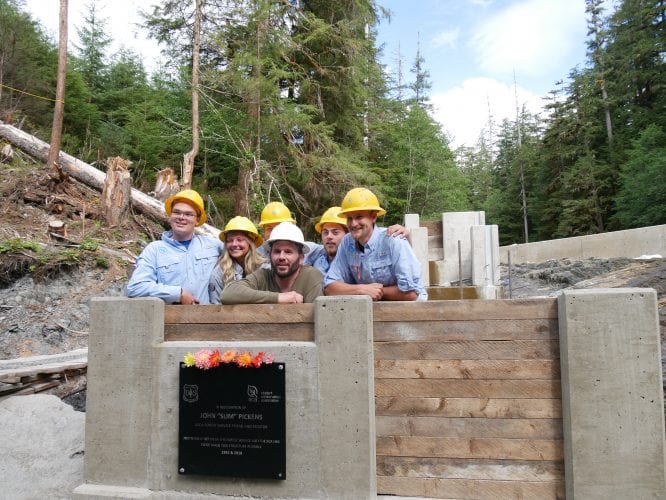
Six Student Conservation Association volunteers and their crew leader re-built the Mitchell Creek fish pass, which was dedicated to John Pickens in August 2018. (Photo/Alanna Elder)
A fish pass near Petersburg has been rebuilt to continue to allow Coho salmon to reach spawning grounds. After a few years of delays the U.S. Forest Service is finishing the Mitchell Creek project this summer.
The work was done by student volunteers, who celebrated the opening with a dedication to a long-time Forest Service employee who had worked on the original pass.
Rachael Stocker led her parents across a wooden boardwalk next to this fish pass on Kupreanof Island. “First they swim up here, then they swim up here,” she explained, walking along what looked like a wide staircase with pools of water instead of steps.
She built the pass along with five other Student Conservation Association volunteers. Stocker and almost everyone else on the crew had leftover tears in their eyes after an emotional day remembering the late John Pickens and talking about a summer experience that was about to come to an end.
“The crew was awesome,” she said. “We’re best friends. And Rob is an awesome boss so. It meaning a lot to him means a lot to us, I think.”
Stocker never knew Pickens, but her crew leader Rob Miller worked with him on fish passes for years.
“He taught me everything I know about construction,” Miller said. “Him and the guy before him. I never had no college classes in construction, they taught me everything. So I’m just carrying it on. Hopefully I can pass it on to someone else that’ll take over when I retire.”
Miller has been leading crews for a quarter century. He said, when this group started, they could barely use a hammer. Now they have rebuilt a fish pass out of concrete and cedar that will keep habitat open to Coho salmon that would otherwise struggle to make it up the creek. He said Pickens, who died of Non-Hodgkin’s lymphoma in 2015, has been on his mind all summer.
“The first day we got out here to this job site, I pulled the crew to the side and told them the emotional significance this project has on me. I actually started crying in front of my crew on the first day,” Miller said.
The crew fastened a plaque memorializing Pickens to one wall of the fish pass in front of a crowd of Forest Service employees and current and former SCA members. Pickens’ wife was also there. This event felt like a memorial and a graduation and a reunion all in one, with a lot of nostalgia mixed up in the fish pass itself. SCA volunteers originally built it with Pickens’ guidance in 1992, and a few of them were there, visiting from all over the country. Not only that, but two of their kids worked on this years’ crew. They handed down this legacy of doing formative conservation work for a summer in Alaska. Rachael Stocker came here by a different route.
“I’m the only one in my family who has ever been to college – or had any environmental work, or interest really,” she said. “They’re all in construction or nursing. It’s funny they always ask, ‘how did you get into this? Who taught you all of this? Why are you interested in it?’ And I don’t know, I kind of just found it on my own.”
Stocker is from Massachusetts. She first came to Alaska when she spent a semester in Juneau on a university exchange. Her parents had wanted to visit her there, but it did not work out. So she invited them to this dedication. At the end of the visit, she would leave with them, and head back east to start her senior year of college in New Hampshire. She studies Environmental Science and Policy.
“Probably go to grad school, I’m hoping, after I graduate. I think I want to study wildlife biology and ecological systems. I really like big carnivores like wolves and bears,” Stocker said.
She added, it feels rewarding to be leaving something for Petersburg residents to enjoy. The fish pass is different from most because it was built to support a sport fishery instead of a commercial one. Most of the crew will stay for another week to finish the project. It cost $300 thousand total, according to the USFS.









